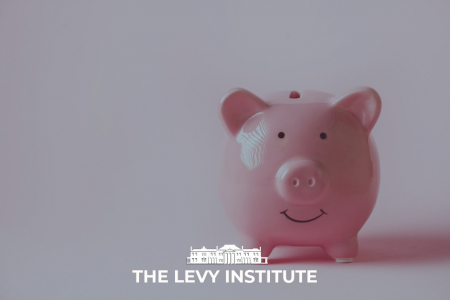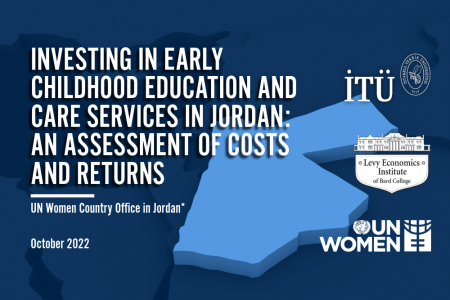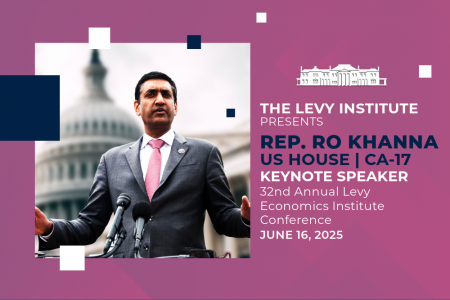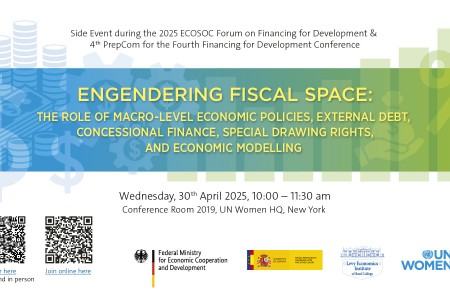Filter by
3527 results found
-
Working Paper No. 1088
The Job Guarantee: Lessons from Argentina’s Jefes Plan and Its Reform
August 01, 2025 According to current macroeconomic models, there is a need to maintain a natural rate of unemployment to contain inflation. Put simply, unemployment is considered an (inevitable) cost of price stability....more Publication -
 Policy Note No. 2025/5
Policy Note No. 2025/5Working Harder, Paying Less: Wage Suppression in Greece
July 30, 2025 The state of the labor market in Greece exemplifies the socioeconomic damage caused by austerity.[i] More than 15 years into a recession that has proven both deep and enduring, signs...more Publication -
Working Paper No. 1087
A Model of External Debt Sustainability and Monetary Hierarchy
July 30, 2025 The author develops a dynamic macroeconomic model of a small open economy to identify two key vulnerabilities that prevent emerging markets from fully integrating into global markets: high financial integration...more Publication -
Working Paper No. 1086
Financial Fragility Without Financial Instability
July 29, 2025 Between the late 1990s and mid-2000s, China’s banking sector underwent a profound yet largely underappreciated transformation—arguably one of the most consequential episodes of financial restructuring in recent economic history. This...more Publication -
 Event
EventLevy Graduate Programs Information Session August 6th
Thinking about graduate school in economics? The Levy Institute programs in economic theory and policy may be just the transformative experience you’re looking for. Learn more, August 6th at our...more Event -
Working Paper No. 1085
Fiscal Deficit and Term Structure of Interest Rate Links on Corporate Investment
July 17, 2025 Using high-frequency macro data from a financially deregulated regime, this paper examines whether there is any evidence of financial crowding out in India. The macroeconomic channel through which financial crowding...more Publication -

Video Now Available from the 32nd Annual Levy Institute Conference
July 16, 2025 Now Available: Full Video from the 32nd Annual Levy Economics Institute Conference We’re pleased to share the full video recordings from our conference on June 16, 2025: “Money, Finance, and...more News -

“Why we should stop worrying and learn to love the national debt,” Wray and Nersisyan for The Hill
July 14, 2025 “Moody’s recent downgrade of the U.S. credit rating has put the national debt in the spotlight once again. Recent increases in Treasury bond yields and the passage of President Trump’s...more News -
 Working Paper No. 1084
Working Paper No. 1084MMT: Heuristics versus Paradigm Shift?
July 09, 2025 This is a revised version of the keynote address presented at the FDR library for the Levy Institute Summer Seminar on Money, Finance, and Public Policy on June 20th, 2025. Publication -

Levy Institute Takes Center Stage at an ILO Conference
July 07, 2025 The Levy Institute was pleased to co-sponsor multiple sessions at the International Labour Organization’s conference, Regulating for Decent Work on July 4th, 2025. We organized a special session on Designing Effective...more News -
 Blog
BlogProtecting Social Security: The Case Against Privatization
July 07, 2025 Attempts to undermine Social Security have been ongoing since its enactment in 1935. As the Social Security Administration projects trust fund insolvency by 2033 and Congress looks for deep spending cuts, the pressure is mounting for Social Security benefit cutbacks, despite promises from President Trump and House Speaker Johnson not to reduce benefits. While extending [...] Blog -
Working Paper No. 1083
Integrating the Social Reproduction of Labor into Macroeconomic Theory: Unpaid Caregiving and Productivity in Paid Production
June 26, 2025 The purpose of this paper is to contribute to the integration of unpaid caregiving in the household into short- and long-term macroeconomic theory and, in particular, the theoretical structure of...more Publication -

Recapping the 32nd Annual Levy Economics Institute Conference
June 20, 2025 The Levy Economics Institute’s flagship conference, which took place on June 16, 2025, was a resounding success. The 32nd Annual Minsky Conference brought together leading scholars and policymakers to examine contemporary developments in finance through...more News -
 Blog
BlogConfronting Financial Fragility, Worker Crisis, and Global Turmoil
June 06, 2025 On June 16, 2025, I will welcome colleagues and friends to the 32nd Annual Conference of the Levy Economics Institute—our first in-person gathering since the pandemic, convening at a moment of extraordinary economic upheaval. The challenges before us are among the most consequential in a century: a global trade order in disarray, deepening economic insecurity [...] Blog -

Understanding Modern Money Theory by L. Randall Wray Out Now
May 23, 2025 In this illuminating book, Senior Scholar L. Randall Wray emphasizes the critical role played by both credit and state money in capitalism and explores the origins and evolution of the...more News -
 Policy Note No. 2025/4
Policy Note No. 2025/4Ratings Agencies Downgrade the Dollar’s Exorbitant Privilege
May 22, 2025 They are at it again. Moody’s has finally joined the other two ratings agencies in downgrading US government debt. Standard & Poor’s downgrade was first in 2011[1], while Fitch waited...more Publication -
 Research Project Report
Research Project ReportInvesting in Early Childhood Education and Care Services in Jordan
May 20, 2025 Written in October 2022, through a collaboration between Istanbul Technical University (ITU) and the Levy Economics Institute in New York by Ipek Ilkkaracan (ITU), Ayse Aylin Bayar (ITU), Luiza Nassif...more Publication -
 Policy Note No. 2025/3
Policy Note No. 2025/3What Do We Save When We DOGE the Government?
May 20, 2025 The second Trump administration has seemingly added a new term to the English vocabulary – getting DOGE-ed. Almost every week we hear about another government agency getting the DOGE treatment,...more Publication -
Working Paper No. 1082
Growth vs. Discipline: Italy’s Fiscal Dilemmas in a Stock-Flow Consistent Model
May 12, 2025 This paper investigates the implications of the European Union’s revised fiscal governance framework for Italy, a country facing the dual challenge of high public debt and persistent economic stagnation. Using...more Publication -
 Blog
BlogTribute to Edwin Le Héron
May 12, 2025 Our eminent French economist colleague, Edwin Le Héron, passed away on 23 April 2025 in Bordeaux. A professor at Sciences Po Bordeaux since 1987, he was the founder and long-standing president of the Association pour le Développement des Études Keynésiennes (ADEK), established in 2000. ADEK has brought together French-speaking post-keynesian economists and organized major international [...] Blog -
 One-Pager No. 73
One-Pager No. 73The Incoming Recession: Are Imports the Real Culprit?
May 05, 2025 The preliminary estimates for real GDP growth in the first quarter of 2025 show an annualized contraction rate of 0.28 percent, along with an extraordinary increase in imports of 41.3...more Publication -

US House Representative Ro Khanna (CA-17) to Give Keynote Address at 32nd Annual Conference
May 05, 2025 The Levy Institute is pleased to announce the keynote speaker for our 32nd Annual Conference: US House Representative Ro Khanna (CA-17)! The 32nd Annual Levy Economics Institute Conference, Money, Finance, and...more News -
 Event
EventSide Event at UN Women 2025 ECOSOC Forum on Financing for Development & FfD4 Conference
The Levy Economics Institute is proud to co-sponsor the side event, “Engendering Fiscal Space: The Role of Macro-Level Economic Policies, External Debt, Concessional Finance, Special Drawing Rights, and Economic Modelling,”...more Event -
 Policy Note No. 2025/2
Policy Note No. 2025/2Remembering Pope Francis’s Call for a Universal Basic Wage
April 21, 2025 On April 21, 2025, a day after Easter Sunday, the world mourned the passing of His Holiness Pope Francis. Five years earlier, on Easter Sunday, April 12, 2020—amid the devastating...more Publication

